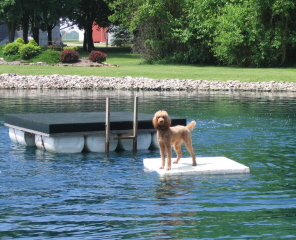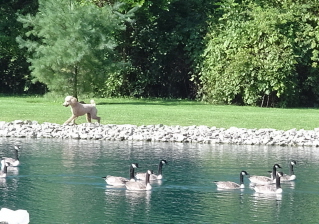
The standard poodle originally came from the early German retrievers, which came to be called pudels, taken from an old German word puddler which means "to splash in or into water." The French name for the poodle is Caniche, which comes from the word canard meaning "duck" making the poodle the "duck dog." Poodles are known for their ability to retrieve downed ducks or geese for hunters. Even the original hair cut for poodles came from the hunters who designed it to keep the poodles upper body organs and joints warm, while shaving the hind area for speed in the water. While most hunting dogs lived outside in kennels, the poodles were kept in the house because they make such wonderful companions.
Gradually, poodles came to be treasured by more than hunters and their families. Their intelligence, appearance, and other pet qualities made them popular with the wealthy Europeans and even royalty. Today, poodles are clever performers, competitive in agility, therapy dogs, and loving companions to the people who own them. Poodles are quick to learn and desire to please their owners. They are very human–like and demand attention. They love to socialize and be with the family. They are very athletic and need an outlet for their abundant energy and intelligence. The poodle’s curly coat is beautiful and soft, but requires regular maintenance. Brushing is a must, at least once a week, and the coat must also be clipped approximately every two months.
Should you get a poodle? If you are an extremely busy person who is almost never home, a poodle is not for you. Poodles want companionship, and they need lots of affection. Their intelligence needs to be challenged with training. The poodle also needs weekly coat care which is time consuming. On the other hand, if what you are looking for is a great companion that’s easy to train and fun to take for walks, on hikes, swimming, boating, or just about anywhere, the poodle is for you. Another positive of poodles is they are nonshedding and have cheerful personalities that adapt to just about any life style. They love to run and play with children, yet, they also adapt well as a companion for a retiree.
Stahlkuppe, Joe. Poodles. New York: Barron's Educational Series, Inc., 1997.

